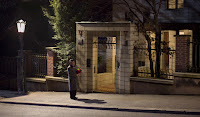In his youth, Czech novelist Josef Skvorecky was an ardent jazz musician, but playing music from America was a dangerous proposition. However, when bassist Herbert Ward temporarily defected, Skvorecky and his bandmates capitalized (so to speak) on Ward’s “anti-imperialist” credentials to openly play their music. James Bulwer is transparently based on Ward, but Danny Smiricky’s friends will not enjoy much protection from their association with him in Andrea Sedlackova’s The Sound of Freedom, based on Skvorecky’s “Little Mata Hari of Prague,” which airs on the Euro Channel.
Of his band, Smiricky was always the least interested in politics. Nevertheless, he always carried guilt over the misfortunes suffered by his bandmates and their social circle. Frankly, he never really understood why he was spared the worst of it, because guilt and innocence were meaningless under Communism. He might have an opportunity to discover why, when Kunovsky, a former secret policeman, offers to sell him his long-lost file.
Back then (predating the Prague Spring), Smiricky just wanted to play and maybe pursue a relationship with Geraldine Brandejsova. She would be bad news anyway, since her mother is British. To make matters worse, Brandejsova has a friend in the American embassy, for whom she acts as a go-between with an activist priest. Kunovsky and his slimy boss have been assigned to build a case against Smiricky’s band. Unfortunately, their vocalist Marcela Razumowska is the obvious weak point for them to pressure. She tries to protect her friends, even breaking up with Richard Kambala, the trombonist-leader, but the life of her imprisoned brother depends on her providing incriminating evidence.
Although Sound of Freedom was produced for Czech television, it is remarkably mature and achingly tragic. It also has a nice swing-era-appropriate soundtrack that includes a number of arrangements by the great Emil Viklicky. There is also a laughably strident propaganda blues for Bulwer, very much like those Ward warbled, while backed by Skvorecky.
Oddly, the various guys in the band do not register as strongly as Marika Soposka and Berenika Kohoutova, as Brandejsova and Razumowska, respectively. Although they create very different personas, each vividly brings home the heartbreaking personal ramifications of life under Soviet Socialism. Both performances ought to earn them consideration for further international exposure. Likewise, Frantisek Nemec really brings home the lingering anguish as the old, haunted Smiricky in the contemporary sequences.
More of Skvorecky’s writings ought to be adapted for the screen, because he wrote about important subjects, jazz and the horrors of Communism. Some of her youthful ensemble were just okay, but Sedlackova had a strong affinity for the themes and story. She went on to further chronicle and illuminate the Czech experience under Communist in the terrific Fair Play and a Havel documentary. Highly recommended for swing fans and young people who can handle a little sex and nudity (remember it was made for European TV), The Sound of Freedom airs 5/16, 5/18, 5/21, 5/22, 5/24, 5/25, and 5/27 on Euro Channel (and it streams on Freevee).

